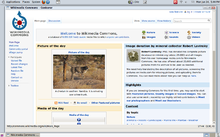Conkeror

Conkeror web browser running on Ubuntu Linux 10.04
|
|
| Developer(s) | Shawn Betts, John J. Foerch, Jeremy Maitin-Shepard |
|---|---|
| Stable release |
1.0.0 / April 13, 2016
|
| Written in | JavaScript |
| Operating system | Cross-platform |
| Platform | XULRunner |
| Type | Web browser |
| License | GNU GPL, GNU LGPL and MPL |
| Website | conkeror |
Conkeror is a Mozilla-based web browser designed to be navigated primarily by a computer keyboard. Its design is mainly patterned after the text editor GNU Emacs, with some influence from other programs, including vi.
It was originally written by Shawn Betts, the primary author of keyboard-driven ratpoison and Stumpwm tiling window managers. Formerly an extension for the Mozilla Firefox browser, it is now developed for XULRunner as a stand-alone application. Development of the extension version was abandoned in 2007.
Conkeror is released under the same set of free software licenses as Mozilla: the GNU General Public License, the GNU Lesser General Public License, and the Mozilla Public License.
Conkeror emphasizes Emacs-derived key bindings and keyboard-based browser navigation. By pressing a key (f, for "follow", by default), Conkeror brings up a small, numbered label beside every element within the current view on the page that can be clicked. The user can type the number of the link and ENTER to follow the link, or type the link name to narrow down the choices; when the part of the name already typed uniquely identifies a link, it becomes numbered one, highlighted green, and then hitting Enter will follow it.
Conkeror has a large number of standard key bindings, and more can be added. The following are some example default key bindings: (key bindings are case sensitive)
Like Emacs, Conkeror makes use of buffers in order to allow multiple pages to remain open at the same time (similar to tabs in traditional browsers). Users can open new buffers and navigate through them using key bindings. For example, C-u C-f opens a hyperlink in a new buffer, C-u C-g goes to a URL or search term in a new buffer, and C-u C-h i opens the start page in a new buffer. Buffers can be cycled through using M-n to go to the next buffer or M-p to go to the previous one. C-x b displays a list of the currently open buffers from which the user can choose a buffer using the up and down arrows.
...
Wikipedia
